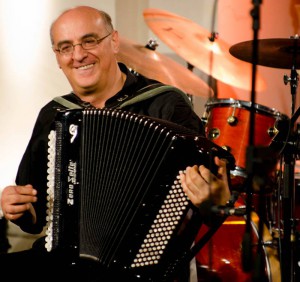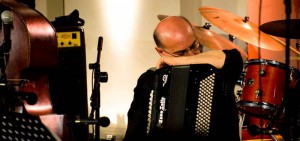 Germano Mazzocchetti is an encyclopaedic musician and composer, with endless culture. Actively as an accordionist and musician for theatre, television, radio and even cinema, he recounts his most significant experiences through this interview.
Germano Mazzocchetti is an encyclopaedic musician and composer, with endless culture. Actively as an accordionist and musician for theatre, television, radio and even cinema, he recounts his most significant experiences through this interview.
For thirty-nine years, thanks to the fortunate and fruitful encounter with well-known director Antonio Calenda, you devote yourself to the composition of music for the theatre. How and why was this important professional partnership born?
My great passions, as a teenager, were always music and theatre. With it I had already had an approach, studying the accordion (a forced, but not disenchanted choice because at that time, at my native country, there was only one school of this instrument). I had known the theatre especially watching the prose on television. And every now and then, when he could, my father brought to Rome some spectacle. It seemed natural to me, at some point in my life, to try to live up to my two passions in a single trade: that of the author of stage music. The occasion was the meeting, at the end of 1977, with Antonio Calenda, then director of the Stabile Theatre of Aquila, who wrote me for the “Representation of the Passion” as an accordionist and author of the original music. Thanks to him I could do what I like. If I had not known him at that particular time, who knows, maybe I would have done something else in life.
Precisely thanks to the Historical Collaboration with Calenda, you have had the opportunity to experience a variety of theatrical genres, from the reworking of variety and popular music from the ’30s to the ‘40s to the musical comedy of a whole, up to the classics of the twentieth-century and contemporary theatre. Which of these ambitions do you feel to express your artistic aesthetics to the utmost?
I think a musician who writes for the theatre should, as far as possible, have a fairly broad knowledge of musical languages. It has to be spaced from a seventeenth-century song a melodrama romance, from a Brechtian song a piece “to Bernstein”. It is clear that everyone will have the cause preferences, a style that feels closer than another, so obviously that chameleonism could bring an annulment of their personal way of understanding music, of what is defined as the style of a musician. But the challenge of my job is just that: try to maintain some recognition in completely different environments. Fiorenzo Carpi (the musician who somehow feels like my master, even though he has never known him before starting composing professionally), was unavoidable. He was able to write in different styles, being perfectly adherent to the idea of the show, while maintaining a personal touch, allowing him to recognize himself immediately.
In your intense career you have worked with a host of renowned international filmmakers Vittorio Gassman, Vincenzo Salemme, Renato Carpentieri, Massimo Venturiello, Luca Zingaretti, Arturo Brachetti and many others. Do you have an anecdote to tell about collaborating with these high-performance names of the show?
I always like to remember when I entered a Roman restaurant and met Vittorio Gassman. I had just collaborated with him for a show titled “Anima e corpo”. He was at a table with his wife, behind the door. I come in, I see him, approach me and greet him. He, without turning more than that, whispers a fleeting “good evening” and resumes eating. I take a table in the nearby room, down to the bottom, along with other friends. After a while, I see him walking in my room, saying, “I ask you to come, I did not recognize you.” All the other table-makers, at that moment, turn to me wondering, who the unknown gentleman Gassman had addressed in that regard. Of course, I felt grateful to that greeting, but at the same time I was blushing, shamefully awhile, because all of them present, until the end of the evening, kept looking at me sneaking towards me without being able to answer. My friends, on the other hand, laughed subtly, reminding me of my embarrassment.
As for the musical theatre you wrote the comedy “Arcobaleno” (directed by Gino Landi), the opera “La ballata dell’amore disonesto” (directed by Augusto Fornari), “Pulcinella e compagnia bella” (Paola’s lyrics Ossorio and directed by Lorenzo Salveti), “Gastone” (text by Nicola Fano and directed by Massimo Venturiello), “Brignano con la O” (by Enrico Brignano), “La strada” (text by Tullio Pinelli and directed by Massimo Venturiello), “Il borghese gentiluomo” (by Molière with the direction of Massimo Venturiello).
From the exquisitely compositional point of view, what are the similarities and differences that characterize your work?
“La ballata dell’amore disonesto” is a performance of entirely singing music theatre. Scripting him, together with Augusto Fornari, we referred to a twentieth-century musical dramaturgy, suggesting a long way in which to refer to the music that is accompanied by popular or jazz quotations, tango and ballet music, ethnic music and theatre of varieties, with arias, duets and concerts that incorporate this linguistic melting pot into the tradition of European music theatre. All the other shows mentioned are musical comedies, written to be faithful to the tradition of the genre, which in my opinion is the transposition to our days of a style born from the German singspiel and, between various transformations, arrives to this day through the Opera Song Brecht and Weill. This means that, except in rare cases, it is not written for singers, but for singing actors. And, of course, the musician must absolutely take it into account. Knowing the extension of the voice for which it is composed and its color inevitably leads to writing precisely for that particular voice and not for another. All this is crucial to know which phrasing to use. I like to remember in this field the collaboration with Massimo Venturiello and Tosca. He is an excellent actor and director, she is the great singer we all know. With them I collaborated in four musical comedies (the fourth is “The Great Dictator”, directed by Chaplin’s film). When we work together it’s all easier, probably this is the secret of our long association. Venturiello is an actor who sings as few in Italy and Tosca is an all-round musician, capable of giving what interprets a sense that at times surprises the same composer.
You are particularly prolific as a composer for cinema, TV and radio. You wrote the soundtrack for the movie “Il viaggio della sposa” (by Sergio Rubini) as well as for films by Nino Russo, Umberto Marino and Carlo Vanzina. On the small screen, however, you have cared for the music of the “Carabinieri”, “Sotto copertura” and “Un dottore quasi perfetto” fiction, while for the radio you are six musical author of various screenplay and variety. Which of these experiences has you most gratified in all respects?
Actually I did very little movie and I regret it. But in Italy, and only here, one can notice that an actor, a director or a musician working mainly in theatre are not called to do cinemas, although there are brilliant cases that show the opposite. I think, especially in my field, Nicola Piovani, who in the cinema co-operated with the greatest directors, also to win an “Oscar”, without forgetting the fact that for years has happily performed around his theatrical performances, after writing numerous music stage. The same goes for Franco Piersanti, active in both fields. This is to say that in cinema I can really speak little. Even on television, my commitment is limited to one series, however long (seven editions), and a spin-off of it.
The gratification of “Carabinieri” music, in addition to the unsuccessful success of fiction, comes from the fact that the nickname for a certain period has been well-known, so to end up in mobile phones. An unusual and surprising thing for one, like me, used to a kind of niche like the theatre. On the radio, however, I worked a lot, especially in the ’80s. I wrote music for variety and it all came to mind. He went into the studio and worked with a group of very close people, from authors of texts, directors and actors. It was a great gym, I composed the music at the moment and was recording right away. He was learning to get away, even with relatively close times. I have been very helpful in gaining experience and in particular what is called a trade without which you are not going anywhere.
The concert entitled “Musica e figure”, which consists of self-signed songs for the theatre, has been performed at various festivals and concert season, including the “Piccolo Regio” in Turin and S. Ivo at the University of Sapienza in Rome. What is the fil rouge of this work?
It’s a concert several years ago. It was a way of performing live music that, written for the theatre, would end their life with the end of the cycle of representations. The organic, rather composite, consisted of three singers, strings, winds and rhythm section. There were songs sung by Greek tragedies, others by musical comedies, others were instrumental and in the plays they played the leitmotif. Or even pieces that in the theatre, as it happens occasionally, if they felt little or very low volume. The fil rouge, I would say, was just this: to show that even “applied” music, in its various forms and styles, may have its creative autonomy, though it is born with other intentions.
Your rich concert activity will take you to the “Germano Mazzocchetti ensemble”, a direct training of yours, whose repertoire is framed on original songs of your pen. What are the peculiarities and distinctive features of your compositions?
The songs, I write for my ensemble, except in some occasional moments, have no theatrical origin. They are composing only thinking of performing in concert. So they should be songs of what Ennio Morricone calls “absolute music”, to distinguish it from the “applied”, that is only thought of as an end in itself and not in reference to something else, dialogues or images. But then, listening, everyone tells me that my music, even those written for the ensemble, are evocative and refer to images or other suggestions. Does this mean that my almost forty-year-long stage musician does not allow me to think of a music that has no references or allusions? Who knows. Let us, for the verdict, let us hear who hears.
 In 2007 you experienced a special moment. On the commission of the “Vicenza Jazz Festival” you composed “Scene da Pinocchio – live sound of the silent movie Pinocchio by Giulio Antamoro” (1911) performed by the Egea Orchestra. How was this singular collaboration born?
In 2007 you experienced a special moment. On the commission of the “Vicenza Jazz Festival” you composed “Scene da Pinocchio – live sound of the silent movie Pinocchio by Giulio Antamoro” (1911) performed by the Egea Orchestra. How was this singular collaboration born?
I had just released the CD “Di mezzo il mare” with the Egea Orchestra, a formation of great musicians who recorded, each with their own projects, for the record label Aegean. The artistic director of the label, Tonino Miscena, at the suggestion of the Vicenza Jazz Festival, proposed to play the first movie in the history of cinema dedicated to the character of Pinocchio, 1911. The music had to be performed alive during the projection. But time was not much, then I decided to make a movie extract, chronologically respecting the succession of scenes and the plot’s performance. I called the piece “Scene da Pinocchio”. The duration of the whole film was about one hour, that of my song 30 minutes, more or less. The thrust of the composition was born from the search for a jumble between the jazz language (which was the very components of the orchestra) and that of the soundtrack, with all the paradigms and modes of a musical commentary of a film, respecting, in addition to the atmospheres of the individual scenes, especially integrating it with the improvised solo of the components of the orchestra. Suns, of course, are embedded in a rigid and not “open” structure, as it is said in jazz, to strictly observe the sequence and duration of the film scenes.
In 2013, you have been the protagonist of the Orchestra Sinfonica Abruzzese concert in the three “Scene per orchestra” concerts, through a series of suites from your stage music and soundtracks. How do I deal with a very delicate role as that of the orchestra conductor?
I’m not an orchestra conductor and I would not dare to call it that. At maximum, I can direct my compositions, but I would never venture to experiment with pieces of other authors. My relationship with management is totally empirical. I learned to get it in the recording room, when I happened to have directed some organically written songs that were a bit larger than the standard. For the choice of the repertoire to be performed with the Orchestra Sinfonica Abruzzese I turned to those compositions that were already thought of as orchestral roses, by retouching and widening the instrumentation appropriately. The “Le campane” by Walter Pagliaro’s “La governante” and “L’uomo elefante” by “Great Varieties Brachetti” by Arturo Brachetti were the only singles of the concert. Then four suites of theatre performances: “Faust” by Glauco Mauri, “Otello” in Calenda, Fabio Grossi’s “Enjoyment of Honor”, Beppe Novello’s “Donne informate sui fatti”. And two soundtracks: a movie, Sergio Rubini’s “il viaggio della sposa” and a radio script, “I tre moschettieri” by Marco Parodi.
Among the countless artistic commitments, is there also room for a new record project?
For now no, I’m not a compulsive publisher of the album. In nine years, only three of them have been released (“Di mezzo e il mare” with the Egea Orchestra, “Testasghemba” and “Asap” with the Germano Mazzocchetti Ensemble). I like to record when the songs have been assimilated and digested by the group after having properly tested them in public. This creates a greater understanding, a cohesion impossible to achieve at the first readings of a composition. Then to post a song album it takes at least a dozen and I’m very lazy.
Questo post è disponibile anche in: Italian

 English
English Italiano
Italiano 





Leave a comment
You must be logged in to post a comment.